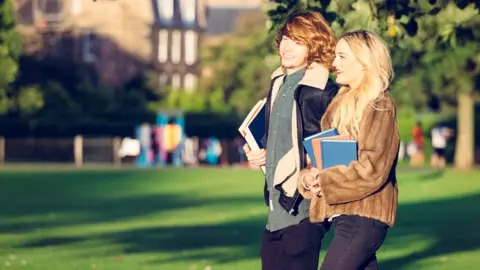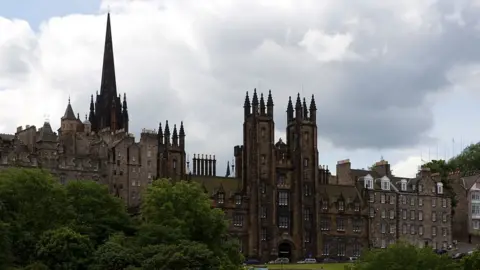Scottish universities see rise in international applicants
 Getty Images
Getty ImagesThe number of people from countries outside Europe who have applied for a place at a Scottish university has gone up despite the coronavirus pandemic.
The 16% rise is revealed in figures from the university admissions service UCAS.
But universities say they will not know for several weeks just how many people will actually take up their places.
Some universities are fearful a drop in the number of international students will badly hit their finances.
Students from countries outside Europe and the UK pay uncapped tuition fees of up to £30,000 a year.
The overall number of applicants to Scottish universities is up 3% on this point last year while the number of Scots who want a place is virtually identical .
The number of applicants from EU countries, including the Republic of Ireland, is down 2%.
 Getty Images
Getty ImagesUniversities Scotland says this data is encouraging but sounded a cautious note.
It will be September before its known how many of those who're offered a place take it up.
'Huge uncertainty'
Alastair Sim, Director of Universities Scotland: said : "The pandemic has cast huge uncertainty over university admissions for entry this year so these data are encouraging, particularly the double-digit rise in international applicants to Scotland's universities.
"However, it will be September before universities know for sure whether offer-holders intend to take up their place.
"Not all international students apply through UCAS, so we can't yet be sure if the positive trend shown in UCAS' data for overseas applicants will be borne out across all international applicants."
 Getty Images
Getty ImagesThe figures also suggest the number of Scots from the most disadvantaged postcode areas who are applying is holding steady.
By 2030, a fifth of students at all Scottish universities will have to come from so-called SIMD20 areas.
Mr Sim said: "Since the pandemic hit, universities have consistently said that they will not let it deter them from efforts to widen access and that they will offer more flexibility to applicants because of the major disruption to schools, to exams and to people's lives in general.
"Today's data suggests that there's been no negative impact, so far, on applicants from the most deprived 20 per cent of Scotland's areas wanting to go to university - applicant numbers have held steady.
"The key data point will come in the form of SQA results next month and UCAS' next data set which will show how the rate of applicants translates into offers and offers accepted."
